A journey through Early Access helped make Hades a masterpiece
For Supergiant, Early Access could have been a journey through hell. Instead, it made Hades even better.
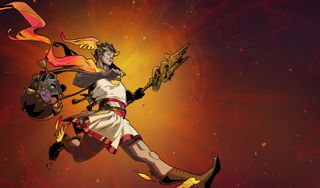
"Before we decided anything else, we decided that we wanted to make an Early Access game," says Hades writer and designer Greg Kasavin. It was a surprising approach for indie studio Supergiant after Bastion, Transistor, and Pyre, none of which were developed in Early Access. But that wasn't as surprising as Hades' announcement back in 2018 as a roguelike—not what you'd expect from a studio best-known for its narratives and sumptuous art.
If you're a fan of our previous games, 'early access roguelike dungeon-crawler' is probably the last thing you want to hear
Greg Kasavin
But the plan worked. Two years later when it came out of Early Access, Hades turned out to be fantastic, and became one of the most talked-about games of the year.
"[Early Access] allowed us to get a small version of Hades out there relatively quickly, see how that goes and then build the rest of it in partnership with our community," Kasavin says. "The roguelike dungeon crawler format is very well suited to that because it offers replayability while we're building out more of the game over time."
Supergiant was eager to build Hades together with their fans, aware that a roguelike was a big departure from their earlier games. "If you’re a fan of our previous games, 'early access roguelike dungeon-crawler' is probably the last thing you want to hear, but I think as soon as they played it people saw this was still a game that had our values in it."
Hades actually shares quite a lot with its predecessors—parts of the isometric combat bring Bastion to mind, and Hades' boon system seems like an enhancement of Transistor's functions. According to Supergiant studio director and co-founder Amir Rao, these aspects are similar by design.
"You learn so much at the end of a project that when you build a new IP, you end up discarding that stuff for different goals, and it was just nice to build up on all the pieces we’d built up over time."

"We're aware of our strengths now, so we just wanted to further refine those things," Kasavin adds. "At some point we thought, 'Why throw away these ideas that we've enjoyed working on? Can't we take some of these things we think we're pretty good at and put them all together in a new way?'"
PC Gamer Newsletter
Sign up to get the best content of the week, and great gaming deals, as picked by the editors.
With an arsenal of existing systems to reinterpret and a community to guide them, Supergiant's team had a clear goal for their roguelike, knowing the genre's reputation for difficulty: Making it approachable.
Rethinking the roguelike
"Hades' gameplay is quite aggressive, and it asks you to take quite a few risks because it's a game where often doing a lot of damage means getting in close. We wanted additional ways to mitigate that," Rao says, naming examples like the Sturdy effect that absorbs some damage, the several different ways to obtain health items, and the boons given by Olympian goddess Demeter, which often come with a chill effect that slows a foe's movements.

Supergiant explored different facets of failure in its previous games. They were never meant to be punishing, even when they challenging. Walk off a ledge at the start of Bastion and the narrator will say, "Then he falls to his death… I'm just fooling!" and bring you back. Lose a match in Pyre and the plot carries on, incorporating that loss into your story.
We had a system whereby people could upvote requests on our Discord, but we actually read all of it
Amir Rao
In Hades, failure is inevitable, and so ending up back at the House of Hades had to feel less like losing and more like coming home. "It was very exciting for us to see the house turn into a place you liked returning to because you decorated it using your gems and get to meet your friends there," Kasavin says.
"No run is wasted," Rao adds. "You will be able to buy new decorations, see something new of the narrative, or invest in your skills and hopefully get a little stronger. It all adds up."
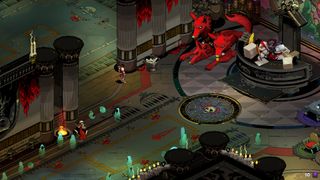
Currently Hades holds a 98% positive rating on Steam, a rating it's kept since Early Access. While they admit to being surprised at the positive response, Kasavin and Rao's good planning and Supergiant's dedication to listening to feedback led directly to this success. Delivering timely updates was paramount.
Supergiant decided that each large update over the course of Early Access, right down to the final version of the game, had to offer new content, including a highlight like a new god. Each update would also address player feedback in a transparent way.
And there was a lot of feedback.
Rao stresses that all of it is useful. "We had a system whereby people could upvote requests on our Discord, but we actually read all of it. We played the game ourselves countless times and we watched streamers play it, and for the first time we also had large amounts of anonymous player data that would tell us stuff like what weapons players would get their first clear with, or where they'd get stuck.
"You begin to see themes across feedback, and sometimes the thing that players are the most vocal about might not even be the thing we need to look at most urgently. For example, something that wasn’t upvoted a lot but appeared frequently were requests for more ways to earn gems, so we came up with more ways to do that."
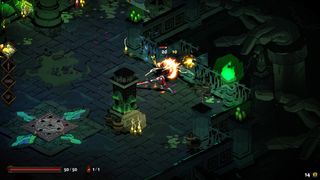
Naturally for a roguelike, a lot of feedback concerned balancing issues related to weapon or boon damage, how long a buff lasted or how enemies behaved. Character speed, damage numbers, the appearance of different boons—everything needs to feel fair and viable to players of different skill levels. Knowing when to stop working on something, however, is also a matter of listening to feedback.
"As soon as there's no more feedback on a thing, it's hands off," Kasavin laughs.
Making every weapon equally balanced wasn't necessarily the end goal. The range of infernal arms plays an important part in making each run feel a little different from the next. Two weapons, the Twin Fists of Malphon and the Adamant Rail, a set of ancient Olympian boxing gloves and a railgun, were conceived during Early Access and represent different playstyles that were important to include. They might seem a bit outlandish for Hades' mythical theme, but the more playstyles there are, the more likely it is that players will find one that suits them.
...we also grew out a few character's roles, like Skelly and Dusa, who initially were only meant for a bit of comic relief
Greg Kasavin
"We've achieved even clear rates with all weapons," Rao says. "We know that certain player types will gravitate to certain weapons but we encourage switching by giving you resources to earn, or by adding the Dark Thirst buff that earns you more darkness if you pick a certain weapon."
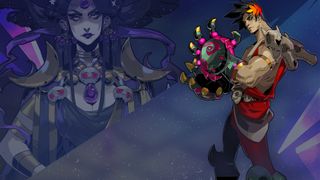
To further incentivise players to try something new, the team came up with the Weapon Aspects, an all-new set of rewards for players daring to use the Pact of Punishment, an optional way to increase Hades' difficulty. They were originally meant to be light modifiers to the base weapons, but the Aspects ended up evolving. In the final game they add a whole new look to weapons, new animations and new fighting styles, an effort that was "practically the same as inventing all-new weapons," Kasavin says.
Both Rao and Kasavin note that finding ways to fulfil community requests made the game better in ways they couldn’t have imagined. "Part of the fun of early access is that you get advocates for different weapons, so we got a lot of people who wanted the bow to be better, or people become fans of a specific Olympian and want their gameplay role to be a little more meaningful, so we definitely did that."
"For the narrative, we also grew out a few character’s roles, like Skelly and Dusa, who initially were only meant for a bit of comic relief, because people liked them so much," Kasavin says.
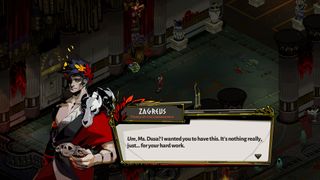
Both men sound happy with how the Early Access experiment went, and how the positive reinforcement from the community and an open exchange of ideas made Hades what it is today.
"The game grew as big as it did due to Early Access," Kasavin says. "A lot of the things we built, even those we had a plan for, were inspired by feedback, and that, together with our drive to make sure each update was as good as the one before it, made the game bigger and better."
Most Popular

